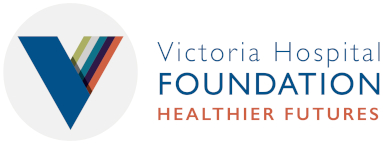The Miracle Garden is a place of introspection, inspiration and innovation. So, it was the perfect setting for the recent launch of a social impact bond that will fund the newly developed Women’s Heart Health Prevention Program. The Government of Manitoba, Victoria Hospital Foundation, and Reh-Fit Centre are partnering with the goal of reducing heart disease for women in Manitoba through early intervention.
This program builds on the success of the For Her Heart’s Sake project, which included a cardiac care program, a research project, and an urgent awareness and education campaign. The Women’s Heart Health Prevention Program will see Victoria Hospital Foundation invest $600,000 over the next three years to support virtual health behavioural mentoring sessions to 400 women at risk of developing heart disease.
The strengths of this program lie in its blueprint: designed by women, tailored to the individual woman, accessible to women, and most importantly, the results will be specific to women. These pillars are fundamental in building a women-specific heart health program.
Why are women’s heart health and mental health important?
Cardiovascular disease and mental health disorders are increasing globally, exacerbated by the COVID-19 pandemic that continues to affect many aspects of our lives. Research shows that for women, heart disease is one of the biggest health threats they face. And, at all phases of their lives, women are more vulnerable to mental illnesses such as depression and anxiety than men. By middle age, women with clinical depression are twice as likely to develop cardiovascular disease.
Research also suggests that being physically active, eating fruits and vegetables, and not smoking can prevent roughly 80% of heart attacks. And, evidence-based programs that target these important risk factors for heart disease can help to reduce the disease's impact and cost.
How will the program work?
We sat down virtually with Sue Boreskie, CEO of the Reh-Fit Centre, who walked us through what the Women’s Heart Health Prevention Program will look like and the positive health outcomes it hopes to generate. Boreskie's passion, expertise and trailblazing nature rang loud and clear as she weaved her way through the details of the project.
The program will run for three years and, over this period, will recruit 400 at-risk women between the ages of 30-65. The participants will be women who do not have heart disease but who show a high probability of developing heart disease based on a number of risk factors such as age, cholesterol, blood pressure, diabetes, and smoking. “Preventing heart disease risk in women is incredibly important, and we know that simple evidence-based interventions, such as increased physical activity and lifestyle coaching, are key to prevention,” says Boreskie.
And, that’s exactly what the Women’s Heart Health Prevention Program aims to do through early intervention!
The program will see the first intake of program participants in January 2022. Care providers from the Province’s My Health Teams will start referring participants from clinics that serve the catchments of ACCESS Fort Garry and ACCESS NorWest, ensuring that women from a wide range of ages, and socio-economic and cultural backgrounds are included in the program. This equity lens will enhance the insights and learning to provide a heart health strategy that respects their local community and acknowledges health equity disparities.
After being referred to the program, the women will undergo an initial in-person assessment to get some baseline measurements and confirm their eligibility. From there, they will have 12-16 hours of individualized and group virtual behavioural-based counselling sessions throughout the 12-month program. These individualized sessions will focus on activity goals, barriers, solutions, and additional community and educational resources to help change lifestyle and dietary habits. At the six-month marker, they will have another in-person re-assessment to see if their risk factors have improved. The last six-month period will see individual and group support booster sessions, followed by a final in-person assessment at 12-months to capture measurements and create a personalized next step and health management plan. Naturally, these end measurements are vital to show the impact that behavioural-based intervention has on the baseline measurements, including blood pressure and physical activity levels.
Women-Focused Input
Key to the program’s success will be the input from women. “What do women want?” is the question that we will be consistently asking, states Boreskie. These conversations will drive the direction of lifestyle coaching, mentoring, primary care integration, and group support; and in turn, empower women with an individualized plan for a healthier future. These aspects will help to create a more robust program with the potential to expand beyond Winnipeg so that more women in Manitoba can benefit.
Tailored to Individual Woman
The inter-professional teams of lifestyle behaviour mentors will all go through the WRHA Behaviour Change Program, so everyone will carry the same knowledge on how to coach someone to change their behaviour. This approach allows the mentors to support the participants along their journey with individualized care that best fits their needs. “It's very different because it's not like you're coming to a group class, the women will be getting a customized conversation based on their personal needs,” Boreskie tells us.
Accessibility
Accessibility is another key factor to the success of the program. Reh-Fit has a wealth of experience with virtual programming and will be using their infrastructure and learnings to launch a completely virtual experience—computer, email and telephone. Over the past 18 months, the pandemic has shifted many services online, from doctor’s appointments to food delivery, so going virtual will allow the program to reach women when and how it’s convenient for them. “This is the first stage of a project and our aim is to reduce the incidence of heart disease for women in Manitoba, but we also want to create something that can be delivered anywhere in Manitoba that’s convenient for whoever we're working with,” said Boreskie.
Women-Specific Results
Boreskie is ecstatic as she tells us about the impact that the results will have on future heart health care for women. “It’s really nice that this program is focused on women and will have results on women, designed by women,” she says. “Chronic conditions are often related to lifestyle habits. Wouldn’t it be great if we can intervene, with women-specific data, at an earlier stage to help prevent chronic heart and mental health conditions, so that people can live a quality life for as long as possible? It’s really exciting that the government accepted the program as a social impact bond because if we can show positive results, then this is a good investment for the government to fund in the future.”
Reh-Fit’s Partnership
This breakthrough program is one that the Reh-Fit Centre is thrilled to be a part of. “The Victoria Hospital has always been progressive in the area of women’s health. We were partners in the Mature Women’s Centre and For Her Hearts Sake project, so it was natural to continue our involvement by leading this project and working with the ACCESS Centres to build healthier communities,” states Boreskie.
Boreskie is quick to acknowledge Victoria Hospital Foundation’s generous donors who had the vision to invest in women’s heart health. “It’s wonderful to know that the donors had such vision in terms of a need in the community and the Women’s Heart Health Prevention Program wouldn’t be happening without them, so I always keep this in mind,” she says.



